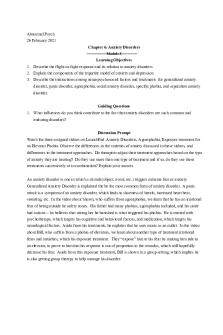Exam 2 Unofficial Study Guide PDF

| Title | Exam 2 Unofficial Study Guide |
|---|---|
| Course | Foundations of Business |
| Institution | University of Utah |
| Pages | 2 |
| File Size | 66.8 KB |
| File Type | |
| Total Downloads | 9 |
| Total Views | 146 |
Summary
Download Exam 2 Unofficial Study Guide PDF
Description
BUS-1050 (Hoff, Carrow, Rabe), Fall 2017 Unofficial 1-page Study Guide to Test No. 2 Wow, where does the time go? I encourage you to begin your studies for the second test by glancing over each of the readings (since the last test only!) in conjunction with your class notes, making sure to devote more time to the selections that you found the most difficult. Then, test yourself with the questions in my emailed announcements (always available in order under Announcements on our Canvas page) and the review questions in the textbook. Please keep in mind that the first few classes after the first test still fell under the chronologically driven, first-half-of-the-semester material. In other words, make sure to think (in part) historically about the Carnegie through Read selections; they ended our mini-history of capitalism and its discontents. Then, you can use the categories of marketing, accounting, and finance to frame your thinking about the more recent readings. Carnegie reveals some continuities with the laissez-faire thinking of his era, but his views on inheritance complicate matters. Similarly, Rockefeller was hardly anti-market (that should be a given!), but he, too, complicates our understanding of turn-of-the-century laissez-faire. Gilman, of course, was unabashedly anti–laissez-faire. How so? Gilman reminds me that several authors commented on gender, and the economics thereof. Comparing and contrasting Gilman, Veblen, and Friedan on gender seems a worthy review device. Eccles, Rand, and Read illuminate one of the big stories of twentieth-century business: the rise and fall of Keynesianism and the concomitant embrace of a conservative, new classical (new laissez-faire) economics. What did Keynes argue and propose? What caused the Great Depression’s remarkable duration, in his view? What should governments in the wealthy world have done to bring about recovery sooner? How was Marriner Eccles a Keynesian? Ayn Rand abhorred Keynesianism. Why? What dominated her views on markets, trade, and government? What did Read argue about markets and international trade? What possible flaws in his logic did we discuss in class, and do you agree with them? Please do not forget that you need to listen to the podcast that updates the story of Read “I, Pencil.” Does this podcast confirm — or challenge — the thesis of “I, Pencil.” Moving onto the marketing unit … I do not have any deep thoughts to unify all of the readings here, but obviously please think about how each relates to the selling of things. (The Darwin and Dreiser elucidate the macro level of business … the overall competition between firms and individuals.) Clearly, this unit emphasized consumption. How did Friedan, Veblen, Galbraith (I and II) critique consumption? (Many students had trouble with Galbraith II; you will want to spend some time there.) We did not read a defense of consumption, but we discussed some of the ways that various people praise it. How might defend consumption from its critics? The accounting section was fairly cut and dry, so just be sure to review (and be able to distinguish) the various readings, so they will not trip you up on the test. Mill — who in fact wrote much more about how firms manage their assets than his excerpt suggests — will be the primary challenge in the finance section. Use the detailed announcement I sent to guide you.
De La Vega, Mackay, and Keynes should be fresh in your mind, as we have not yet discussed them. Are markets rational? Are people? Why or why not?...
Similar Free PDFs

Exam 2 Unofficial Study Guide
- 2 Pages

Exam 1 Unofficial Study Guide
- 1 Pages

Exam 2 Study Guide
- 32 Pages

Exam 2 Study Guide
- 5 Pages

Exam #2 Study Guide
- 4 Pages

Exam 2 study guide
- 29 Pages

Exam 2 Study Guide
- 71 Pages

Exam 2 Study Guide
- 2 Pages

Exam 2 Study Guide
- 24 Pages

EXAM 2 Study Guide
- 25 Pages

Exam 2 study guide
- 4 Pages

EXAM 2 study guide
- 5 Pages

Exam 2 Study Guide
- 11 Pages

Exam 2 Study Guide
- 10 Pages

Exam 2 Study Guide
- 6 Pages

Exam 2 Study Guide
- 17 Pages
Popular Institutions
- Tinajero National High School - Annex
- Politeknik Caltex Riau
- Yokohama City University
- SGT University
- University of Al-Qadisiyah
- Divine Word College of Vigan
- Techniek College Rotterdam
- Universidade de Santiago
- Universiti Teknologi MARA Cawangan Johor Kampus Pasir Gudang
- Poltekkes Kemenkes Yogyakarta
- Baguio City National High School
- Colegio san marcos
- preparatoria uno
- Centro de Bachillerato Tecnológico Industrial y de Servicios No. 107
- Dalian Maritime University
- Quang Trung Secondary School
- Colegio Tecnológico en Informática
- Corporación Regional de Educación Superior
- Grupo CEDVA
- Dar Al Uloom University
- Centro de Estudios Preuniversitarios de la Universidad Nacional de Ingeniería
- 上智大学
- Aakash International School, Nuna Majara
- San Felipe Neri Catholic School
- Kang Chiao International School - New Taipei City
- Misamis Occidental National High School
- Institución Educativa Escuela Normal Juan Ladrilleros
- Kolehiyo ng Pantukan
- Batanes State College
- Instituto Continental
- Sekolah Menengah Kejuruan Kesehatan Kaltara (Tarakan)
- Colegio de La Inmaculada Concepcion - Cebu